Billy Coffey's Blog, page 42
April 2, 2012
Mabe Man
 I read an article last week about how scientists are just now getting results from tests they ran on a 126,000-year-old human. Mabe Man, they call him, because he was found near Mabe in China's Guandong Province.
I read an article last week about how scientists are just now getting results from tests they ran on a 126,000-year-old human. Mabe Man, they call him, because he was found near Mabe in China's Guandong Province.
Not really the sort of article I would be interested in, but I had some time to kill and it was either that or stare at the wall in front of me. So I kept reading.
I'm glad I did.
Seems Mabe Man had a rough go at it. That in itself isn't surprising—I would imagine life back then was fraught with all sorts of peril, not the least of which was where to find the next meal. Life expectancy hovered around thirty years. Our place in the food chain was somewhere south of saber-toothed tigers.
When Mabe Man was first discovered in 1958, his bones were cataloged, shoved in a museum basement, and promptly forgotten. It was only recently that he was rediscovered again. Fortunately, science has progressed quite a bit over the last 60 years. There's a lot we can know about him now that could only be guessed then, and a lot of fancy tests that can help bring out the humanity in our ancestors. Things like a simple CT scan, for instance. When the scientists did just that, what they found was morbidly interesting in the same way as witnessing the aftermath of a car wreck.
To break it down to a level I could understand, Mabe Man had gotten the hell beaten out of him.
His skull had been fractured. Scientists concluded it was the result of blunt force trauma. Not your everyday sort of blunt force trauma, either. This poor guy didn't receive his injuries by tripping over a rock in some primeval forest. No, he was beaten. The conclusion was that his wounds could have only been given by some sort of clubbed weapon.
The scientists seemed surprised at that finding. Not me. And I doubt that deep down you're not very surprised, either. Recorded history is full of violence. Full of war and hate and bloodshed. I read once that when all the annals of every nation's history are combined, what you get is a total of seven years of peace. Seven out of tens of thousands. We've always hurt each other. We always will. It's a basic tenet of the Christian faith—we all sin and fall short of the glory of God.
Mabe Man's story could end there, but it doesn't. There's more. His wounds would have caused excessive bleeding and a severe concussion. Brain damage would have been likely. He was helpless. And 126,000 years ago, being helpless meant you were dead.
But he didn't die.
His wounds healed.
And not only did they heal, but he lived for years afterward.
Why? Because he was cared for. He was nursed back to health. His wounds were bound and his stomach was filled and he was given shelter.
Scientists seemed even more surprised at that. Mabe Man survived because he was loved.
Me, I find a beauty there, and also a profound truth. It means love has always sought to put back together that which hate has broken. It means that our hands have always been able to heal as much as harm. It means that since the dawn of humanity, each of us contains three people—the angel, the demon, and the one who decides which we will obey. That's what it means to be human.
That's a basic tenet of the Christian faith, too.
Share and Enjoy:

March 29, 2012
Creating magic
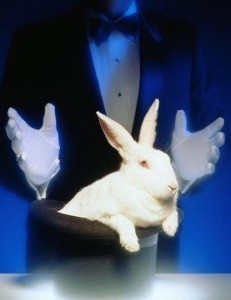
image courtesy of photobucket.com
I'll say I'm a writer because I can't speak. At least not well and not in front of large groups of people I do not know. I've done so anyway, and many times. And truthfully, I do just fine as long as I don't count the "aint's" and dropped g's that come out of my mouth.
The invitation to speak that I received last week wasn't one I could pass up. It wasn't a fancy conference, wasn't in a fancy city. It didn't pay well (actually, it didn't pay at all). It was instead for career day at the local elementary school.
It isn't often that I get to play author, much less play one for an entire day. Despite the props I brought along—two books, a typed manuscript, and one bulging notebook—I knew it would be a rough road to travel. After all, I was going up against firemen and police officers and radio personalities. A writer would have a tough time competing with that with a bunch of grownups, much less a hundred fourth graders.
But as it turned out I didn't have much to worry about at all. Sure, they were fourth graders—that peculiar brand of kid to which both reading and writing are anathema. So I started with the fact that when I was their age, I hated reading and writing, too.
It was all downhill from there.
I'm smart enough to know that kids aren't much interested in publishers or first drafts or the horror that is the adverb, smart enough to know that adults aren't much interested in them either. But I've found over the years that everyone, regardless of age or interest, perks up whenever I mention a writer's primary gift to the world.
Not wisdom. Not inspiration. Not tight plots or moving themes or even memorable characters. No, writers do what they do because of one reason and one reason only—
They get to create magic.
They didn't believe me, of course. Not right away. One kid asked me to make his pencil disappear if I knew magic. Another wanted me to guess the number she was thinking. I told them I couldn't and that it didn't matter, because the magic writers do was better. It was the greatest magic of all.
It was the magic of writing words down on a page that make pictures in other people's minds.
It was the magic of being able to create entire worlds from scratch and put anything I wanted to in them.
It was the magic of being able to touch another person's heart, a person who might live far away, someone you've never spoken to and likely will never meet.
And best of all, I told them, is that everyone possesses a bit of that magic. Anyone could be a writer. Didn't matter if you were rich or poor, didn't matter what color you were, didn't even matter if you went to college or not. That magic was still in us.
It takes time, of course. All magic does. But I told them that if they did three simple things, that magic would grow and eventually spill out.
You have to read, I said. Every day.
And you have to write. Every day.
And most important of all, you have to believe you're special. Because there is only one you in this world, and the way you see life is different than the way anyone else who's ever lived has seen it. That's why your story is so important. So needed. After all, that's what the magic is for.
Turns out that an informal poll conducted by the teachers placed me second of the day's top speakers. The winner was the radio guy. I wasn't surprised. I can't compete with someone who's met Taylor Swift and Trace Adkins. I wouldn't even try.
But a teacher told me that the next day when it came time for her class to do their journal writing, there was much less grumbling than usual. They were ready. Eager. When she asked why, her kids told her they wanted to make some magic.
Me, too.
Share and Enjoy:

March 26, 2012
A wonderful long evening
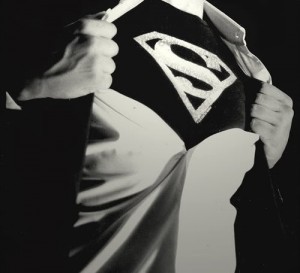 I write this late on a Friday night. A cool March breeze is wafting through the open window, bringing with it the smell of fresh cut grass and green spring leaves. The creek outside gurgles, mixing with the songs of frogs and crickets. I imagine them lullabies, and it's working. Because between you and me, I don't think I've ever been this tired in my life.
I write this late on a Friday night. A cool March breeze is wafting through the open window, bringing with it the smell of fresh cut grass and green spring leaves. The creek outside gurgles, mixing with the songs of frogs and crickets. I imagine them lullabies, and it's working. Because between you and me, I don't think I've ever been this tired in my life.
Why you ask? Easy. My son had a birthday party this evening. Seven eight-year-old boys gathered together on this small plot of earth, mouths rambling, bodies jittery, their little minds propelled by youth and cupcakes. And me, one tired man who trudged home after a long day at work, tasked with keeping them all both occupied and out of trouble.
So we played kickball. We played dodgeball. We threw acorns in the creek, wrestled, raced, taunted, ate, belched, laughed, and pondered the eternal mystery that is the opposite sex. And when all of that was done, the entire party devolved into one ginormous water gun fight.
To this thirty-nine-year-old who works two jobs and had beaten the sun out of bed this morning, the whole thing was a little bit of heaven with an equal measure of hell.
But I did it anyway, and without complaint. Because this was my boy. This was my buddy.
This was my son.
It's funny what kids do to you. A lot of people say you change when you become a parent, but I don't think that's completely true. I think children just show you who you really were all along, deep down, past all the pretense we tend to pile upon ourselves.
I think that's what happened with me, anyway. That's what my son did. He became a mirror that I hold up to myself every day. He's shown me who I really am.
Before him, I never knew I was so small. I never paused to consider just how many things I did not know, things like what makes the sun shine and how the moon got there and where yesterday goes when today comes. Until he came along, I thought there was nothing in the world that could scare me or leave me worrying. Before him, I thought I was mere steps below Superman.
But then he came, and I realized I was a lot less than I believed myself to be. I was not perfect. I was not smart. And I most certainly was nowhere close to Superman.
And you know what? That's okay. Because my son hasn't just shown me how small I am. He's shown me how big I am, too.
Without him I would have never known that I could heal scrapes with a simple kiss. Or that my talents with Legos could appear as genius. I would have never guessed that a simple bedtime story could inspire imagination.
I had no idea that I could be someone's hero.
And yet that's what he's done, every minute of every day, for eight beautiful years.
So yes, I'm tired. It's been a long evening.
A wonderful long evening.
Share and Enjoy:

March 22, 2012
Feeding Henry
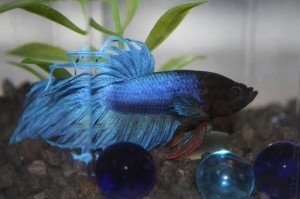
image courtesy of photobucket.com
To watch my son feed Henry is to behold an act that approaches the hallowed. The way he will stand in front of the bowl and fold his arms atop the dresser. The way he grasps the small bottle of food and shake out four pinhead-sized pellets into his hand. How he holds them to the lamplight so Henry can see and then slowly turns his hand over so the pellets can drop to the water. Each done with a slow purpose that defines a Serious Moment. It seemed odd at first, almost comical. All this care to feed a simple betta fish.
My son named it Henry on the way home from the pet store. He wanted a dog. His mother and I said no. Dogs are a big deal, I told him, so let's start smaller. You buy the fish, the bowl, the gravel, and the food. You feed him twice a day and change his water every other week. Then we'll talk dog.
Now a month later, my son is content and Henry is flourishing. His bowl rests in a prime location atop the dresser, situated with a clear view of both the bedroom and the woods outside. The lamp is near and is kept on at night (I've been told Henry's afraid of the dark), and a small ceramic bridge has been placed in the gravel, courtesy of a good report card.
We will often watch Henry at night before I tuck my son into bed. Truthfully, betta fish are as entertaining as a rock. It takes effort to keep boredom at bay. I will comment on how purple Henry is and how his tail and lower fins fan out as he glides. He's getting bigger, I'll say. My son will nod like a proud parent and then sigh as Henry bumps against the glass edges of his world. He doesn't think Henry is all that bright but loves him nonetheless.
It is an unpretentious pet for an unpretentious boy, nothing more. Until it's time to eat.
I wondered why for a long while but didn't ask for fear that I'd spoil whatever meaning my son assigned to the act. Besides, I figured he would eventually explain without the prodding. He did last night.
He was looking at the bowl when he said, "Henry's mine."
"That's right."
"Nobody else's."
I nodded. "Nobody else's."
He looked from Henry to me and said, "If I don't feed him, he'll turn into a skeleton. This is serious, Daddy. A skeleton is the opposite of a fish."
I waited for more. That statement alone couldn't possibly be enough to warrant the solemnity my son found dropping four tiny fish pellets into a bowl of water. A seven-year-old child knows that rule number one is that if you want to stay living, you have to eat.
No further explanation came. In fact, I got the sense that my son felt anything more would be superfluous.
Then I thought maybe he was right. He'd said all that was needed. The idea of having to feed something to keep it alive was simple to me. It had always been simple to him, too. But now things were different. It was no longer simply an idea, it was a reality. Henry depended on him. That fact alone made feeding Henry more than a responsibility, it made it a privilege.
That my son has learned this by way of a three-dollar fish that possesses questionable intelligence and little entertainment value is not lost on me. But I think the big things in life often come in small packages, and I have no doubt Henry has given him a very big thing.
One day my son will have to feed more than a fish. He'll have to feed things like dreams and love and hope, possessions which require much more nourishment than four tiny pellets twice a day could ever offer. He'll have to be as serious about it then as he is now. Just as not feeding Henry will result in the opposite of Henry, not feeding his aspirations will result in a rudderless life. Starving his love will result in apathy. And if my son deprives himself of hope, how will he not look upon the world with anything other than hopelessness?
My son's right—this is serious. It's a good thing Henry has him.
It's a good thing he has Henry, too.
***
In other Coffeyland news, I'm readying a trip to the great city of Nashville, Tennessee. The good news is that I'll be meeting with my publisher. The bad news is that I'm going to have to fly. Luckily, Katdish helped me out with a very informative post here: The Hillbilly Guide to Air Travel. Go enjoy.
Share and Enjoy:

March 19, 2012
When you make a mess

image courtesy of photobucket.com
How it ended up like this I cannot say. I know I didn't intend for it to happen. But happen it did. Not all at once—these things never unfold all at once—but slowly, like how spring turns to summer or twilight melts into full dark.
And it's dark now, oh yes it is. Metaphorically, anyway. It's just after one in the afternoon on a beautiful Saturday, and in this, at least, I've found a blessing. It's early still. Which means if I get started now, I can get this mess cleaned up by tonight.
It started simply, as most messes do. And also like most messes, I went into it with the absolute best of intentions. And yet what was to be a quick trip upstairs to straighten my office has resulted in an apocalypse of papers and books the likes of which seem almost Biblical. My wife nearly called 911 when she walked in a few minutes ago. My kids dared me to ever tell them to throw away a notebook again. FEMA may have to be summoned.
I don't know how this happened.
I promise you.
But that's what we always say when we make a mess, isn't it? Me, anyway. They're often the first words out of my mouth—"I don't know how this happened." Followed closely by the points I've already mentioned:
I don't know how things got this way.
I never wanted this.
I had the best of intentions.
Of course none of those matter, at least not now. All that counts is the mess. The whys and hows are irrelevant.
The only question is how I'm going to clean it up.
It won't be easy. Messes never are. It requires digging through the garbage you've made for yourself. Cleaning up a mess hurts so much because along the way you always discover those things that should have mattered but were somehow forgotten instead (like the I love you Daddy! card I just found mashed into a novel I never finished reading). It hurts because so much damage has been done that you think things will never really be fixed—the mess will always be there, and things will never be the same again.
And in that moment of absolute remorse, a part of you believes that's the way it should be. You messed up. You—the one who is old enough and wise enough to know better, the one who's witnessed friends and family and strangers on the television news make their own messes and said "That'll never be me."
You.
Me.
So here I sit, in my mess.
For me, in this moment, it consists of little more than notebooks and papers and half-finished manuscripts and, amazingly enough, a half-eaten box of Fiddle Faddle. For you, things may be much worse.
Trust me when I say that makes no difference. When it comes to a mess, there are no degrees. A mess is a mess. And you and I will get through our messes together. We will fix things.
For me, it's book by book. For you, perhaps relationship by relationship.
Paper by paper.
I'm sorry by I'm sorry.
Cleaning.
Healing.
Minute by minute.
Day by day.
We will straighten and clean. We will dust off the important things we've misplaced and toss out those things we thought we needed but didn't. We'll put away and take out.
We will make things sparkle again.
Share and Enjoy:

March 15, 2012
Karly's story
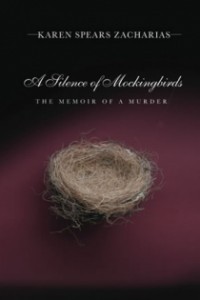 The email Karen sent me the other day included this:
The email Karen sent me the other day included this:
"I could cite for you all the statistics on child abuse, but let me give you just one — over five children a day are murdered in the US — the bulk of them are abused, neglected and killed by their own mothers."
That was shocking to me. Not so for Karen. It was one of those many dark realities of life that led her to write her forthcoming book, A Silence of Mockingbirds, which chronicles the life and death of little Karly Sheehan. It will be released in April to coincide with National Child Abuse Prevention month.
I don't normally ask my readers to consider buying a book, but Karen Spears Zacharias is a friend and a fantastic writer, and Karly's story is one that needs to be told. What happened to Karly? What was Sarah's involvement? And how did Karly's father, an Irish immigrant, end up as the state's primary suspect in the abuse investigation? A Silence of Mockingbirds is not a simple love story – it is the troubling tale of a father's love for the daughter he was unable to protect.
Included below is a portion of an interview Karen gave about the book:
Question: How did you meet Sarah Brill Sheehan?
Karen: As a young teenager Sarah Brill was assigned to an in-school detention class that I was supervising. Sarah possessed the jaw-dropping beauty of Halle Berry, and the reckless nature of Casey Anthony. She embodied a certain dangerous vulnerability that I recognized, so I reached out to her in a mentoring way that teachers often do.
Question: How was it Sarah came to live with your family?
Karen: At age 19, Sarah got pregnant. She asked my husband and me to adopt that child. For a variety of reasons we didn't, but after Sarah gave birth she came to live with us. We considered Sarah our "adopted daughter."
Question: So Karly wasn't her first child?
Karen: No. She adopted her first daughter out to someone I introduced to her. Karly was the daughter she had with David Sheehan. A native of Kenmare, County Kerry, Ireland. David met Sarah in Corvallis, Oregon, home to Oregon State University. David was an engineer in town for training at Hewlitt-Packard's Corvallis campus, when the two met. They married in a Reno rush, lived in Ireland for a short time, and eventually settled in Corvallis, where Karly was born in January 2002.
Question: What happened to Karly?
Karen: She was murdered on June 3, 2005.
Question: Does the book contain specific recommendations for individuals and society in preventing child abuse?
Karen: Yes. Absolutely. The book is being released in April to coincide with National Child Abuse Prevention month. I have partnered with national advocacy groups such as Childhelp (Childhelp.org), Child Abuse Intervention Centers, the National Children's Alliance (NationalChildrensAlliance.org) and Fathers and Families (FathersandFamilies.org) to help raise awareness about our nation's child abuse epidemic.
Flannery O'Connor said it best: "The truth doesn't change based upon our ability to stomach it."
Abused children don't need us to feel sorry for them. They need us to act on their behalf – as family, as friends, as neighbors, as teachers, as doctors, as law enforcement officers, as reporters, as pastors, and as legislators. That is the only way we are going to curb this crisis. We cannot fix this world but we can change it.
But we can't even do that until we educate ourselves on what we are failing to do and what we need to do better. A Silence of Mockingbirds provides practical insights into the subtle, and sometimes glaringly obvious things we overlook, the multitudes of ways in which abuse insinuates itself into our neighborhoods, and our communities, and our families. Everyone in Karly Sheehan's life was college-educated. Many of them were trained professionals who were supposed to be able to identify and prevent child abuse. Yet, Karly's abuse had been ongoing for months prior to her death. These people should have known better. Why didn't they?
For more information on this book, go to MacAdamCage.com.
For more information on the author, go to karenzach.com
To schedule an event, please contact khandschuch@gmail.com
Share and Enjoy:

March 12, 2012
Lucky Kim

image courtesy of photobucket.com
Ask my kids, and they will tell you that I am currently in the parental equivalent of the doghouse. My sin? Telling them no. Well, I suppose that's not it exactly. My real sin is that I am not the kind of parent that Lucky Kim has.
Let me explain.
The Sandersons live in the yellow house down on the corner, a lovely little Cape Cod complete with white picket fence, a jungle gym, and a trampoline in the backyard. All of which has been purchased and placed in order to occupy the youngest Sanderson, an eight-year-old named Kim.
The elder Sandersons seem to be a good enough lot. Dad works at a nonprofit in the city, and Mom, from what I gather, seems to be a professional volunteer. I've seen her on early Saturday mornings, placing signs and placards into the trunk of their hybrid car that correspond to whatever cause seems to be the flavor of the month. Her husband and little Kim will follow out soon after, and off they go. I guess it depends on the issue as to whether they protest or support. They've been fairy busy since all this Occupy Wall Street stuff began.
They're pretty progressive folks, the Sandersons. And when you live in a pretty traditional town like ours, that makes you stand out about as much as a purple elephant. But they're good folks nonetheless. I figure to each his (or her) own.
Our kids have been over there once or twice to play with Kim. They always return with fantastical tales. Not merely of Kim's toys or the trampoline in the backyard, but also of how Kim's parents treat her as an adult rather than a child. Kim can generally come and go as she pleases. She can eat whatever she wants (as long as it isn't meat, as my son informed me the Sandersons are "vagetaryins").
At any rate, hanging around so much progressivism has got my kids to thinking, Why can't my mom and day be like Kim's? I got so tired of hearing about how fortunate the younger Sanderson is and how much better her life will surely become that after a couple weeks, I began referring to her as Lucky Kim.
I tell my kids to clean their rooms. They say Lucky Kim never has to clean her room.
I tell them to do their homework. They say Lucky Kim's folks say homework isn't nearly as important as "real life experience."
I tell them to say their prayers. They say Lucky Kim's folks don't believe in God, which is kind of sad usually but sometimes must be kinda nice because then you can do whatever you want and never feel guilty after.
You get the idea. It all kind of got out of hand.
There's been a Lucky Kim moratorium in place for a few days now. I'm not sure if that was really the right way to handle things, but that's how I did. Sometimes parenting is all about going with your head and not your heart.
I hear Lucky Kim's folks think this is all because of their politics, another instance of liberals like them never being able to get along with conservatives like me. I don't know if there's anything to that. I like to think it isn't. I like to think that despite whatever differences people have, they can still get together long enough to play every once in a while.
Then again, sometimes those differences are so great that it might be best to keep a little distance. And with us, those differences are pretty great. We're equal in that all we want is a good future for our kids, one where they can grow and live and love and become anything they want to be.
I guess you could say that where we veer away from each other is the area of focus. You see, the Sandersons are all about making the world better for our children. That's why they do the things they do. And don't get me wrong, that's admirable. In fact, you could say I was once like that.
But me, I do the things I do for another reason.
I say no and I set limits and I make my kids work not so I can make the world better for them, but so I can make them better for the world.
My children don't understand that. Not now.
But they will later, and they will thank me for it.
Share and Enjoy:

March 8, 2012
RIP Rainbow
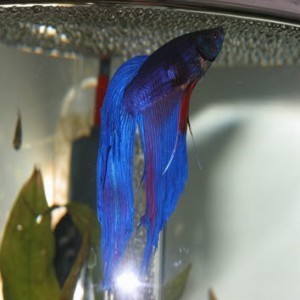
image courtesy of photobucket.com
It seemed fish would make a good pet for the kids. Fish are low maintenance, always stay in one place, and, as far as I can tell, are generally happy creatures. Not to mention the fact that their food is inexpensive, trips to the vet are not required, and there's no need to get up in the middle of the night to let them out so they can do their business (my son: "Know what the best thing about being a fish is? You can poop ANYWHERE.").
So when pet time came, yes. Fish.
I have no idea why my son christened his blue betta fish Henry, other than the fact that he said it looked like a Henry. But that's another story for another time. What I want to talk about is Rainbow, my daughter's fish.
Purple and flowery and somewhat aloof, Rainbow has spent her days fluttering around in her fishbowl and napping behind two tiny ceramic columns perched in the corner of the gravel. Rainbow doesn't do much other than that, though that hasn't stopped my daughter from being endlessly fascinated. It's the way her fish glides through the water, she told me. The way her fins and tail splay out and wave. The way she will dive deep and rub herself against the gravel and then ease her way upward to scan for food on the surface. It's all so pretty, she told me.
And I suppose it was, in a way. But in another way I also knew it wasn't. I wouldn't say I've been around a lot of fish in my life, but I've been around enough to know when one is nice and healthy and when one is…well, not so much.
Looking back, I probably should have broached that touchy subject. I didn't. It's a mark on my Daddy scorecard to be sure, but honestly I simply put Rainbow out of my mind. Really, how often do you think about a fish?
Rainbow died two days ago.
Worse, my daughter was first on the scene.
The preliminary (and very amateurish) investigation concluded that the cause of death could have come from either of two possibilities. The icky gooey white stuff oozing from Rainbow's stomach suggested that whatever bomb was ticking inside of her finally went off. And a particularly cold and blustery March night had left my daughter's room downright cold to the point that Rainbow's water was a cool 58 degrees.
None of that mattered, of course. What mattered was that this fish, my daughter's pet and the object of her fascination, was dead.
It was something my daughter had thankfully never had to face until then. All of her grandparents and aunts and uncles are still alive. All of her friends and acquaintances. All still here, still living and napping and floating in our own fishbowl world. She'd never had ponder the imponderable that is death.
My daughter did what we all do when faced with that bitterness—she cried, then she picked herself up and went on with the business of giving Rainbow a proper farewell. There was a private ceremony in the bathroom where she talked about how fish went to heaven just like people did, and how there wasn't a beginning and an end to life but simply a beginning and then another beginning after. She thanked Rainbow for being her pet and God for sending Rainbow to her. There was a moment of silence that was followed by a long, somber flush.
My daughter's better now. The spot where Rainbow's bowl once stood is bare and will likely be so for a long while. Sometimes I'll spot her staring at that emptiness, remembering. That's okay. I think we all give such stares at the emptiness our loved ones leave behind in their passing. But she'll pull through. She must. Life is ever forward.
This morning I found taped above the toilet that became Rainbow's final resting place a small paper tombstone. Written on it in a little girl's cursive scrawl were these words:
"Rest in peace, Rainbow the betta fish. May you float in water that's the perfect temperature."
And so may we all.
Share and Enjoy:

March 5, 2012
What's your sign?
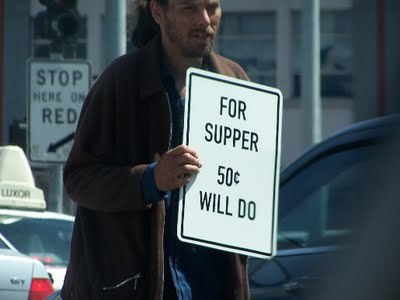
Our sleepy town doesn't really have a homeless problem. None that I know of, anyway. Those who through choice or circumstance lose their station in life usually have family or friends who are more than willing to offer them a place to stay.
But things are different in the nearby cities, where there are more than a few poor souls who have slipped through the cracks and settled on society's murky bottom. Forgotten or, even worse, ignored.
You see these people most often perched along the busiest intersections. Their appearance is consistent with their desperation and need—dirty clothes, often a dirtier hat, unshaven and gaunt. And there is always a sign.
VETERAN PLEASE HELP GOD BLESS.
HIV+ NEED MEDICINE.
HUNGRY FAR FROM HOME PLEASE GIVE.
I have friends who refuse to give to such people based upon the skepticism that whatever proceeds these people receive will be used for less than savory activities. They don't want to be a part of enabling a drug addict to buy more meth or a drunk more liquor. I also have friends who give regardless, believing that their act of mercy, of helping the helpless, is an act God happens to smile brightly upon.
I happen to adopt the latter position and give as often as I can, though I'll admit there have been more than a few times when I have questioned the validity of their statements.
Still, these signs have always fascinated me. They represent the current state of one person's life pared down to reveal only the essentials. One story able to fit on a single piece of discarded cardboard. And they are each by necessity crafted to initiate an immediate response. They are not designed to persuade through the intellect or please the eyes. They are meant to be shot as an arrow into the heart.
After running a few errands in the city yesterday, I was on my way home when I saw a man sitting by the guardrail on the opposite side of the road. His flannel shirt hung loosely from his body, sleeves rolled up against the hot sun. The blue work pants that completed the outfit were the sort that provided the maximum amount of wear for the least amount of money. A pair of untied brown tennis shoes shuffled the gravel.
But it was his sign that caught my attention. Three words, and no more. Three words that spoke very much with very little and offered honesty rather than a plea.
DESPERATE AND TIRED, it read.
The rush hour traffic was such that I couldn't turn around and offer him what I could. I didn't have much choice but to keep going. As I drove I watched him through the side mirror, hoping someone would stop.
No one did. Some, I suppose, didn't notice him. Others probably did but then decided not to. One car full of teenagers blew their horn and offered a chorus of middle fingers.
The man never moved. Never shifted his weight or lifted his head. This was not so much an insult as it was the status quo.
Yet I realized that we all were in many ways like that poor man. Like all of the lost souls who roam our streets and barely manage to survive. We've all slipped through our own share of cracks at some point.
VETERAN PLEASE HELP GOD BLESS? We've all sacrificed, given all we've had, only to not get the same returned back to us.
HIV+ NEED MEDICINE? We are all hurting in our own way. Some are afflicted with physical ailments. Others have their ailments on the inside. Many of us have both.
HUNGRY FAR FROM HOME PLEASE GIVE? Within each of us is a hunger, whether to love or be loved, that can only be filled by a God who at this moment is readying a faraway place for us to call home.
And let's not forget the last. DESPERATE AND TIRED. How many times have we all felt that way?
The difference between us and them have much less to do with our level of comfort and much more to do with our level of honesty.
Because we all carry a sign that tells the story of our lives, pared down to reveal only the essentials. They choose to show the world in a bid for help. We don't. And for that, they are better.
***
This post is part of the One Word at a Time Blog Carnival: Madness, hosted by Peter Pollock. For most posts on this topic, please visit PeterPollock.com
Share and Enjoy:

March 1, 2012
Happy Birthday, Dr. Seuss!
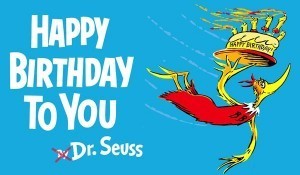 Theodor and Henrietta Geisel welcomed their son into the world on March 2, 1904 . They gave the boy his father's name, though he wasn't a junior—young Theodor's middle name was Seuss.
Theodor and Henrietta Geisel welcomed their son into the world on March 2, 1904 . They gave the boy his father's name, though he wasn't a junior—young Theodor's middle name was Seuss.
Geisel went on to attend Dartmouth College and graduated in 1925. He was returning from a trip abroad in 1937 when the rhythm of the ship's engines inspired what would become his first book, And to Think That I Saw it on Mulberry Street. That book was rejected nearly thirty times before it found a publisher, and Theodor Geisel became Dr. Seuss.
Few writers will ever achieve the enduring popularity of Dr. Seuss, fewer still will come to hold such a prominent place in the childhoods of so many people. I was raised on the Grinch and the Cat in the Hat. So were my kids. And to this day I'll pull a worn copy of one of his books from my shelf and read it. Wisdom comes from many places, and it often pours forth from the minds of those who write for children.
In honor of Dr. Seuss's 108th birthday, I'll leave you with some of my favorite quotes from his books. They've inspired, they've healed, and they've gotten me through.
"Today you are You, that is truer than true. There is no one alive who is Youer than You."
"You'll miss the best things if you keep your eyes shut."
"It's opener, out there, in the wide, open air."
"Will you succeed? Yes you will indeed! Ninety-eight and three-quarters percent guaranteed."
"Step with care and great tact. And remember that Life's a Great Balancing Act."
"From there to here, and here to there, funny things are everywhere."
"Unless someone like you cares a whole awful lot, nothing is going to get better. It's not."
"Today I shall behave, as if this is the day I will be remembered."
"It is better to know how to learn than to know."
"Everything stinks till it's finished."
"Why fit in when you were born to stand out?"
"Think and wonder, wonder and think."
"The more that you read, the more things you will know. The more that you learn, the more places you'll go."
"A person's a person, no matter how small."
And one more, my all-time favorite: "Don't cry because it's over. Smile because it happened."
What's your favorite Dr. Seuss quote?
Share and Enjoy:




